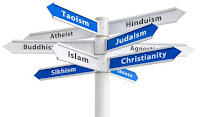A simile is a stylistic device in which two ideas are compared using a connector.
"City looks like a heap of baking-powder. It's gone." (page 162) In this part of the book, Bradbury is comparing the city after the bombarding with a heap of baking-powder. This simile makes the reader imagine how destroyed the city is because baking-powder is formed by really tiny pieces that almost look like dust, meaning that the city is now practically dirt.
Allusion
An allusion is a short reference to a person, place or event that has importance in the culture, history or literature of the world.
"You think you can walk on water with your books." (page 111) In this fragment, Beatty makes an allusion to Jesus walking on water (Mark 6:45-51., Bible). With this, he wants to show that if people read books, they would escape reality and imagine unreal things. The reader feels that the character is trying to convey people about something that is not true, because in the present society that does not happen.
A metaphor is a figure of speech used to compare two different objects without any connectors. An allusion is a short reference to a person, place or event that has importance in the culture, history or literature of the world.
"You think you can walk on water with your books." (page 111) In this fragment, Beatty makes an allusion to Jesus walking on water (Mark 6:45-51., Bible). With this, he wants to show that if people read books, they would escape reality and imagine unreal things. The reader feels that the character is trying to convey people about something that is not true, because in the present society that does not happen.
Metaphor
"as quick as the whisper of a scythe the war was finished" (page 158) This fragment of the novel compares the end of the war to a scythe. A scythe is a tool used to mow grass, but it is also the symbol of death. As the myth says, death comes with its scythe and silently kills you, that is why Bradbury uses the word "whisper". It makes the reader understand that after the bombarding many people have died, even if it is not explicitly explained.
Alliteration
Alliteration is a literary device in which several words in a row start with the same consonant.
·"Burning Bright"(part III) It is the title of the third part of the book and it is meant to call the attention of the reader. The fact that it creates a musical sound, attracts the audience's attention and makes it more interesting.
Personification
Personification is used to give human-like characteristics to an object.











